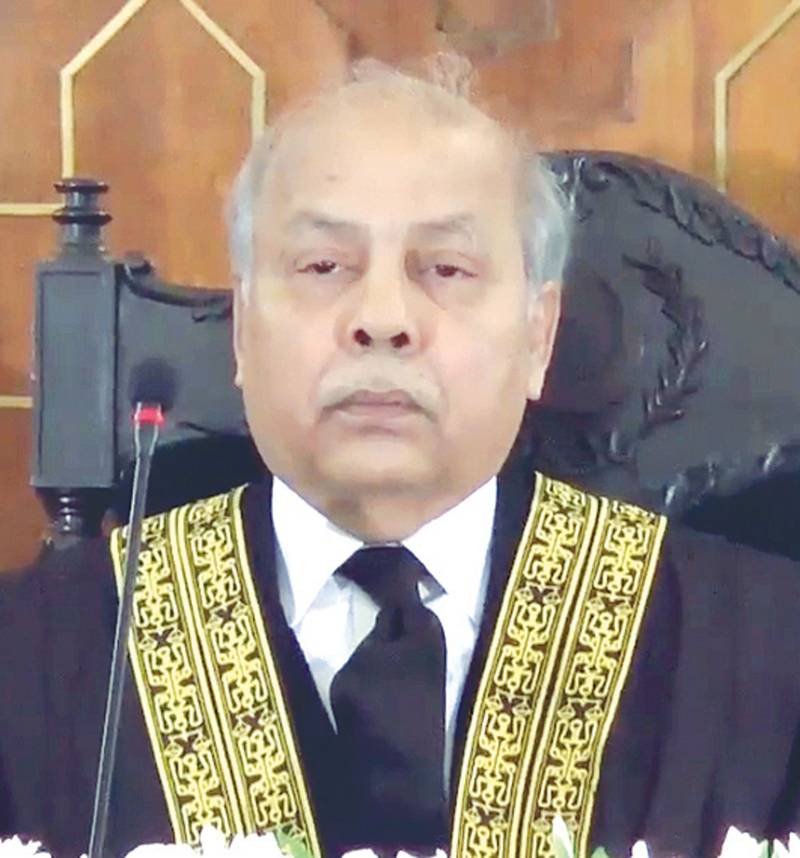ISLAMABAD - The Supreme Court of Pakistan yesterday ordered the federal government to make the Army Public School (APS), Peshawar, terror attack report public.
A three-member bench of the apex court headed by Chief Justice of Pakistan Justice Gulzar Ahmed conducted hearing of a suo moto notice about the Army Public School Peshawar tragedy.
In this matter, the former Chief Justice Mian Saqib Nisar had taken suo moto of the incident on the request of victims’ parents and in October 2018 had set up a one-man judicial commission headed by Justice Ibrahim Khan, a judge of Peshawar High Court. The commission was made after the parents of children demanded of the authorities to form a high-level inquiry commission to investigate the massacre.
More than 140 persons, most of them students and school staffers, were martyred when militants attacked the school on December 16, 2014. The attack was claimed by the banned Tehreek-e-Taliban Pakistan.
On the last hearing on August 4, the apex court had ordered the Additional Attorney General (AAG) to get instructions from the federal government on the inquiry commission report on Army Public School (APS) carnage.
Chief Justice Gulzar noted that the action was taken against the junior employees. He asked the attorney general to stop this trend of taking action against the junior officers. The time has come for every incident’s investigation to be started at the top, he added.
The Chief Justice questioned that why the information of the attack was not given to the APS administration earlier. He said that the negligent officers are as responsible as the terrorists. The government should ensure that there is no tragedy like the APS attack in future.
He said that the government is also responsible for making sure the victims’ parents are satisfied with the action it has taken.
Chief Justice Gulzar said that the security agencies should have been aware of this conspiracy. “People are not safe even in such high-security zones. How did such a big security lapse occur? What’s the point of such high security when people still are not safe,” the CJP asked.
Justice Ijazul Ahsan termed the APS massacre “the grief of the entire nation”, telling the martyrs’ parents that it “is not only your grief, but also it’s our grief.”
Refusing to dispose of the suo moto case, the bench adjourned the case for one month. The attorney-general has been ordered to present the government’s strategy on the next hearing.
The Judicial Commission noted in its report, “I can perceive it with utmost honesty that when one’s own blood and flesh commit treachery and betrayal, the result would always be devastating.” “No agency; how capable and able in terms of manpower, infrastructure and technology, could outperform the impact of any attack effortlessly when infidels are within the inside.”
The revelations made in the 525-page report — containing recorded statements of 132 people, including parents of the killed school children and police and army officials — made public on Friday on the directive of the Supreme Court.
The report, in its conclusion, noted that terrorism perpetrated by the country’s enemies had reached its peak in the year 2013-14, but said, “this [still] doesn’t obligate us to hold that our sensitive installation(s) and soft target(s) could be forsaken as a prey to the terrorists’ attack.”
It said that the entry of terrorists from across the Afghan border into the school’s perimeter after “befooling the security apparatus” was mainly due to the porous nature of the border and the “unrestrained movement” of Afghan refugees across the frontier.
It observed that the National Counter Terrorism Authority (Nacta) had issued a generic threat alert about terrorists seeking to target army families and academic institutions as retribution for the successful military operations Zarb-i-Azb and Khyber-I against militants.
Following this, although the armed forces successfully operated against terrorists’ niches, “the incident of APS plagued their success stories which deserved deification,” the report added.
Detailing the “fiasco” in the school’s security apparatus, the inquiry commission said that the number of static guards, which comprised the first tier of security, was “incomparable” to the looming threat. The guards’ improper position and accentuated main gates and front area compromised the school’s security from the back, from where the terrorists managed to enter “with no retaliation”.
“Equally incomprehensible is the inertia on part of the Askari Guards as well as the deputed static guards to the initial heavy firing and blasts by terrorists,” the report read. “Had they showed a little response and could engage the militants at the very beginning of the attack, the impact of the incident might have been lesser.”
However, it noted that the terrorists’ movement towards the adjacent toddlers’ block of the school was restricted by soldiers of MVT-2 (security patrolling team) and QRF on their arrival. According to the report, the unit regulating MVT-1 has been handed down punishment by a “court of inquiry”.






